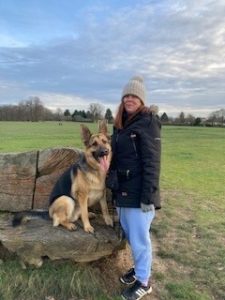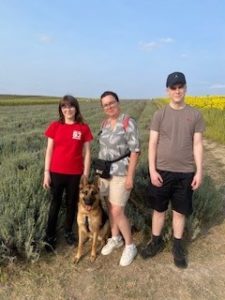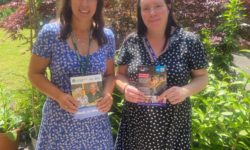Welcome back to our ‘A Day in the Life’ series, where we chat to HILS team members to see what they get up to in a typical day and the impact their efforts have on clients across our services.
This month we are looking at Rachel, our Community Advocate.
HILS Hertfordshire advocacy team consists of a small but perfectly formed team of two people – Rachel and Elizabeth. HILS Hertfordshire were awarded a 5 year contract by Hertfordshire County Council to provide advocacy support to the over 65’s in the summer of 2024. Support is provided free of charge to eligible clients throughout Hertfordshire with cases assigned from all over the county.
Meet Rachel…….

Advocacy is a fascinating yet niche service, often unfamiliar to those outside the world of social care. It’s a role defined by variety, unpredictability, and, above all, the potential to create meaningful change. While no two days—or even cases—are the same, here’s a glimpse into what life as an advocate at HILS is like.
Getting the day started
The day starts early, often with a strong cup of coffee and a review of ongoing cases. Each referral brings its own story, and no two are alike. Many of our clients come through POhWER, a nationwide advocacy charity. In Hertfordshire, they’re based in Stevenage, and Elizabeth (my colleague) and I frequently attend their training sessions and team meetings. These sessions are invaluable, offering opportunities to seek advice on complex cases, share experiences, and celebrate successes.
New cases
Once a new case is assigned, I usually begin by reaching out to the referrer. Referrals can be brief, leaving much to uncover. A quick call to a social worker, family member, or healthcare professional often fills in the blanks. Next, I arrange to meet the client, typically in a location that suits them—a care home, their own home, or even a public space like a library or café. Meeting clients 1:1 is crucial. It allows me to truly hear their voice without interruptions or interpretations.
One of the most memorable clients I’ve met had house rabbits! During our visit, one of these charming rabbits hopped onto my lap, behaving more like a cat or dog. It’s moments like these that remind me how unique every individual’s life is.
The nature of advocacy work often means our initial meetings or calls can feel heavy. After all, people seek advocacy support when they’re facing a challenge they can’t resolve alone. But that’s also what makes this job so rewarding—helping to ease someone’s burden and seeing their relief when progress is made.
Next steps
What happens after the meeting depends entirely on the client’s needs. Some days, I’m drafting complaint letters or sending emails to social workers, housing associations, or care agencies. Other days, I’m on the phone with the Department of Work and Pensions, GP practices, or even MPs and Ombudsmen if the issue requires escalating. Sometimes, my role is to empower clients to self-advocate—helping them prepare for a difficult phone call or supporting them as they respond to letters.
Not all cases are lengthy. In some instances, I visit a client, gather their views, and write a report to assist in a best-interest decision-making process or a care review. But no matter how long a case lasts, Elizabeth and I remain committed to pursuing every possible avenue to resolve the issue.
Behind the scenes, meticulous record-keeping is essential. Case notes document everything—emails, phone calls, meetings, and supervision discussions. These notes ensure transparency and continuity, especially when a case involves multiple agencies.
A bit of balance

Flexibility is a cornerstone of my role, something I deeply value as a working mum of two teenagers and a volunteer with Guide Dogs UK. HILS understands the need for flexibility in working hours, and while my contract is for 20 hours a week, those hours often find me writing case notes outside of standard working hours, but this works for me.
Advocacy may be challenging, but it’s a privilege to stand alongside people during some of their most difficult moments and work together to achieve positive outcomes. No two days are ever the same, and that’s exactly how I like it.
Are you interested in joining the HILS family? Check out our current vacancies, where you can see our vacancies across Hertfordshire, Hampshire and West Sussex. We’d love to hear from you.

